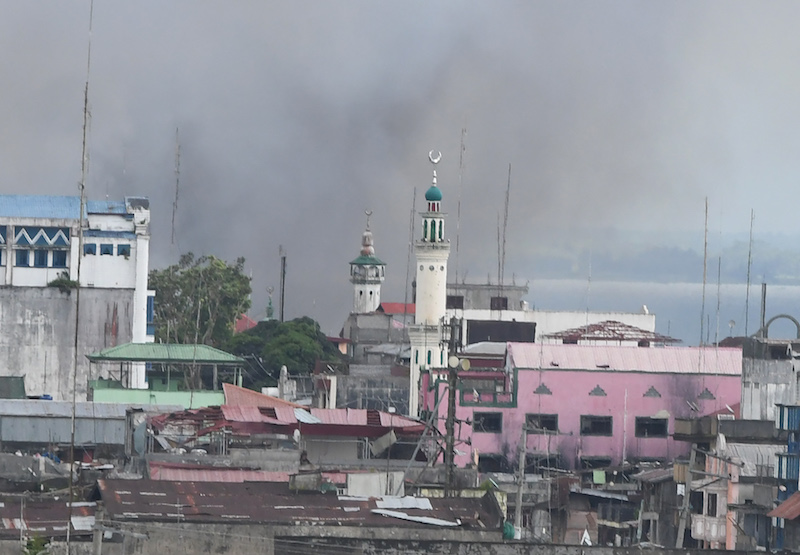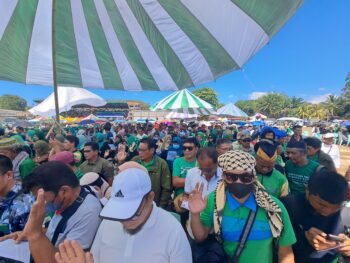MARAWI CITY (MindaNews / 14 June) — Mosques are not targets of air strikes in this country’s lone Islamic City, Lt. Gen. Carlito Galvez, chief of the Western Mindanao Command (WestMinCom) said.
“I am a man of peace. We will not bomb or target any mosque,” Galvez told MindaNews in a text message Wednesday morning, clarifying media reports that the Armed Forces of the Philippines (AFP) had opted to bomb mosques where the Maute Group had reportedly encamped and used as machine gun and snipers’ nests.
 NOT BOMBED. The Bato Ali mosque located within the conflict zone in Marawi City stands against a backdrop of smoke from bombs dropped at a distance on Wednesday, 14 June 2017. The Armed Forces of the Philippines has issued a statement categorically stating that it has “not bombed and will not bomb mosques in Marawi.” The Maute terror group has reportedly encamped in mosques and uses them as machine-gun and snipers’ nests. MindaNews photo by FROILAN GALLARDO
NOT BOMBED. The Bato Ali mosque located within the conflict zone in Marawi City stands against a backdrop of smoke from bombs dropped at a distance on Wednesday, 14 June 2017. The Armed Forces of the Philippines has issued a statement categorically stating that it has “not bombed and will not bomb mosques in Marawi.” The Maute terror group has reportedly encamped in mosques and uses them as machine-gun and snipers’ nests. MindaNews photo by FROILAN GALLARDO
Galvez explained that mosques and other religious and cultural places “have never been our target,” adding that this is “the reason why I had more than 50 KIAs (killed in action) and 297 WIAs (wounded in action) because of our extremely restrictive rules of engagements.”
Until now, he said, mosques are “no fire areas.”
Assemblyman Zia Alonto Adiong, spokesperson of the Provincial Crisis Management Committee told MindaNews that among the mosques in the conflict zone are the Jameo Mindanao Al-Islamie (Islamic Center) or what is referred to as the Grand Mosque, Bato Ali Mosque, Darussalam Mosque, Marinaut Mosque, Bro. Naga Mosque, Harat Medina Mosque.
The Marawi Crisis entered its 23rd day Wednesday.
In Malacanang, Brig. Gen. Restituto Padilla, AFP spokesperson clarified during the Mindanao Hour press briefing that they “will not bomb” mosques in the area.
Padilla read a statement “directly ordered” by Armed Forces Chief of Staff Eduardo Ano, categorically stating that the AFP has “not bombed and will not bomb mosques in Marawi” and that its leadership is “firm in its commitment to use other options that would flush out this Maute/Daesh-inspired group from these places of worship that they have converted into machine gun and sniper nest, defensive position, and arsenals for their war activities.”
The AFP assured Muslims that it will “not go down to the level of these terrorists who desecrate places of worship to lure government security forces into responding to their violent activities in a similar manner.”
The statement expressed confidence it will be able to retake the remaining portion of Marawi held by the Maute Group “through other options available to the Armed Forces.”
Padilla hoped the statement would be passed on “to our Muslim brothers and sisters who have since last night been clarifying the issue.”
Galvez said the Maute Group is “really a disgrace to the Maranaos.”
“They killed innocent civilians without mercy. They desecrated the Grand Mosque, Islamic Center and WAQF Building and made them as fighting positions and bases. They have no respect for anyone, destroyed places of worship our Muslim and Christian brothers hold dear,” he said.
But Galvez maintained that “until now, mosques are no fire areas.”
“No deadlines”
In Malacanang, Padilla reiterated that the AFP Chief of Staff himself said “we will not bomb any mosque” but he called on all religious leaders “to more or less dissuade any of those that they may reach in those mosques from using those areas of worship as havens for this armed confrontation.”
As the Marawi Crisis entered its 23rd day, Padilla said they will no longer set deadlines.
“We will not set deadlines. We will ensure that we are able to clear (conflict zone) of any armed element that still exists and it may take some time,” Padilla said.
This, after three previously set deadlines failed to end the crisis.
Defense Secretary Delfin Lorenzana had earlier said the Marawi Crisis would be over by Friday, June 2. On June 3, President Duterte told reporters in Camp Evangelista, Cagayan de Oro after visiting wounded soldiers at the hospital there that “this will be over in about three more days” or by June 6. On June 8, Brig. Gen. Rolando Joselito Bautista, commander of the 1st Infantry Division, said they will “gain headway” by June 12, after Galvez announced they were “looking at the possibility that the end will be near.”
Padilla acknowledged that in clearing Marawi of terrorists, the problem lies “in urban terrain operations.”
“The military activities that are conducted in open terrains like jungles are a different story when it is compared to urban terrain. In an urban terrain where civilians are still currently trapped and may possibly be used as human shields or may be hit by crossfire, troops have to be very careful,” he explained.
As of June 9, the spokespersons of the Provincial Crisis Management Committee and the 1st Infantry Division, Assemblyman Zia Alonto Adiong and Lt. Col. Jo-Ar Herrera estimated 500 to 1,000 civilians remain trapped in the conflict zone while Bautista on June 8 said that based on their assessment as of morning of June 8, there are still “more or less 230 local terrorists in the area” and about 100 hostages.
Padilla said their rules of engagement are “very different” in urban terrain. “We have to be very careful, we have to very judicious, we have to be very deliberate so as to avoid hitting innocent lives.”
He acknowledged the “slow process of liberating Marawi.”
Four out of Marawi’s 96 barangays, he said, “remain to be problematic areas where forces of the Maute/ ISIS-inspired or Daesh-inspired group still remain.”
“So we will continue to take care of these areas. We will progressively get in and neutralize these targets if they opt to keep on fighting. But we will have to do it on a very painstaking manner in consideration of lives still trapped in the area,” Padilla said.
He cited the five Maranao policemen who escaped the conflict zone with five Christian workers on Tuesday.
“Opportunities of this nature,” according to Padilla, are what they are working on “so that anyone else trapped in (an) area can make it through safe refuge and save their lives.”
“If it takes a little more time then so be it, for as long those lives are safe,” Padilla added. (Carolyn O. Arguillas / MindaNews)
